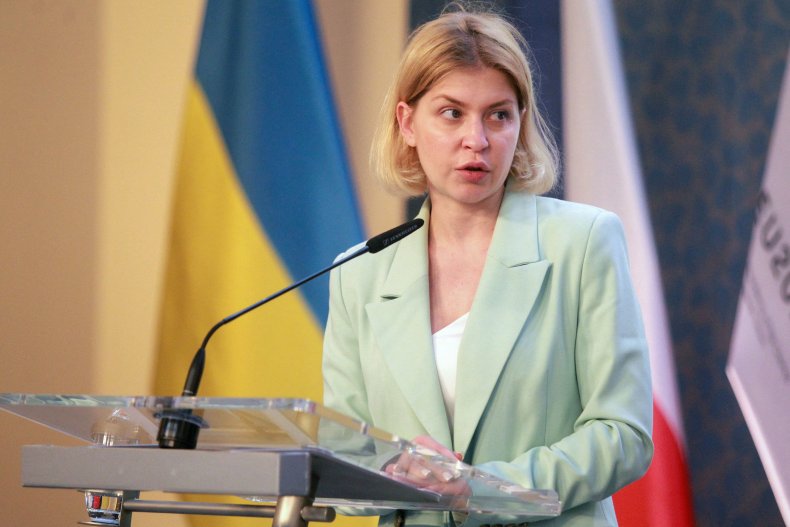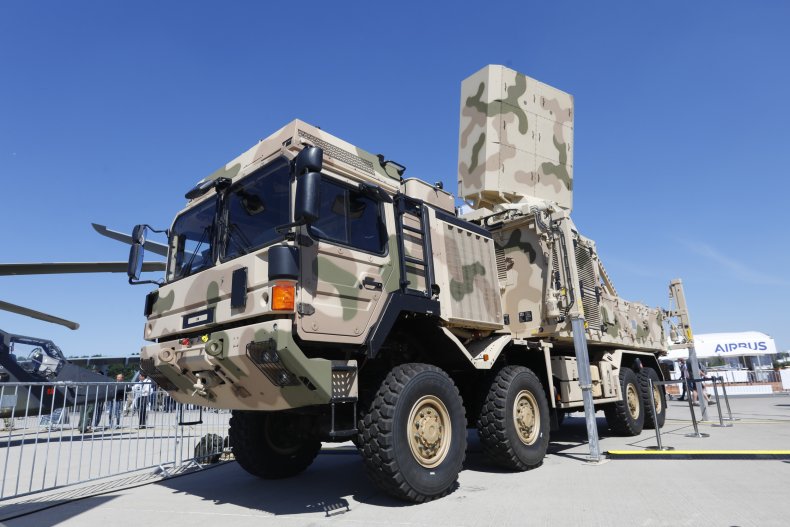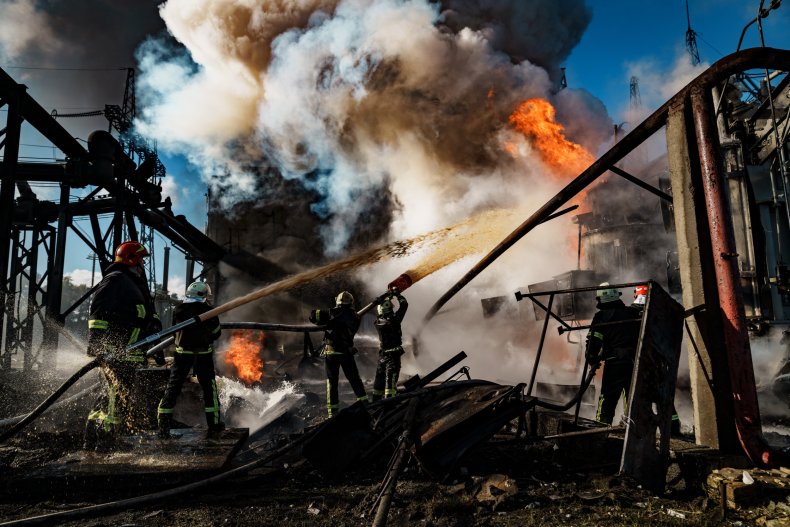Russia Missile Strikes Push Ukraine Closer to ‘No-Fly Zone’: Deputy PM
Russia’s massed missile strikes on Ukraine earlier this week appear to have backfired for the Kremlin, prompting a “very serious” reassessment of Western military aid to Kyiv and pushing it closer to the long-held ambition of having a no-fly zone over the country, according to Deputy Prime Minister Olha Stefanishyna.
Stefanishyna, the deputy prime minister for Euro-Atlantic integration, told Newsweek in an exclusive interview that the nationwide attacks caused “massive destruction,” but that they ultimately represented an expensive expression of desperation.
Almost 100 missiles hit cities across Ukraine on Monday and Tuesday, collapsing electrical grids, internet networks, and disrupting vital water and gas supplies. But Moscow’s infrastructure blitz didn’t last, perhaps evidence of its dwindling supply of high-precision munitions.
“Nearly half of those missiles were destroyed by the anti-air defense systems of Ukraine, and all of the electricity grids have already been restored,” Stefanishyna said on Thursday. “The Russians are spending hundreds of millions of dollars just to show that they’re desperate.”
Newsweek has contacted the Russian Foreign Ministry to request comment.

MILAN KAMMERMAYER/AFP via Getty Images
Kyiv’s Western partners quickly expressed revulsion at the Russian strikes, which killed at least 19 people and wounded more than 100. The U.S., Germany and Spain have all since pledged more anti-aircraft systems or the acceleration of already-committed platforms. Defense Minister Oleksii Reznkiov on Tuesday lauded “a new era of air defense.”
Stefanishyna told Newsweek that the missile strikes have significantly influenced Western thinking on Ukrainian defense.
“It is unfortunate that it took us eight months to make sure that we were heard when we were screaming about ensuring a no-fly zone over Ukraine,” she said. “Now we’re on the way.”
Ukrainian officials have expressed hope that this week’s blanket bombings will accelerate talks on other Kyiv priorities, including a G7 price cap on Russian oil exports, Ukraine’s NATO membership, its journey to European Union ascension, and bilateral security arrangements laid out in the recently proposed Kyiv Security Compact.
“The security guarantees based on the Kyiv Security Compact, which has been recently presented by the Ukrainian side, have been treated very seriously,” Stefanishyna said.
“The shift is very serious; we can see it by the statements,” she said of comments and commitments from Western partners.
“Now we have to preserve this dynamic and make sure that next time Russia decides to use a couple of hundred million dollars to kill Ukrainian people, we will be able to protect not only 50 percent of our skies but 100 percent.”
Anti-aircraft systems are top of Ukraine’s shopping list, but leaders in Kyiv have cited the Russian strikes as evidence of the need for fighter jets and other advanced weapons, such as the ATACMS guided long-range missile fired by the HIMARS platform.
“I’m very far from answering yes,” Stefanishyna said, when asked if Ukraine was close to securing fighter jets and ATACMS. “But the progress is really, really significant.”
Diplomatic Freeze
Russia’s recent escalations—including its mobilization order, claimed annexation of four occupied Ukrainian regions, missile strikes, and nuclear threats—have also galvanized diplomatic efforts to isolate Moscow.
This week, the G7 declared that Moscow has “blatantly violated” the United Nations charter, while the UN General Assembly overwhelmingly backed a vote condemning the Kremlin’s recent annexations.
Stefanishyna lauded these developments as “a very strong reaction.” The deputy prime minister said she hopes recent events will fortify Western resolve on Ukraine, particularly within the EU family that Kyiv hopes to join in coming years. Ukraine, already awarded candidate status, hopes to begin accession talks with the bloc by the end of 2023.
“We believe that on most of the important things, the consensus has been found,” she said. “I’m sure that the European Union, Europe generally, will survive this winter and will become stronger after this winter.”
“I think this process will pave the way to much stronger restrictions on the Russian Federation,” Stefanishyna added. “It will take time but I’m sure that there will be a window of opportunity for that in winter or in spring.”
Moscow’s nuclear brinkmanship is perturbing Western leaders, eliciting warnings of devastating conventional—but not nuclear—retaliation to any Russian nuclear strike.
Stefanishyna urged a “zero tolerance” approach by Kyiv’s foreign partners. “I’m sure that to the Russian Federation, through inner channels, this information has been given in a very, very detailed way,” she said.
“Russia is continuing its nuclear blackmail of Ukraine, which is not a nuclear state, which opens the way for other nuclear countries—let’s say unfriendly nuclear countries—to act in the same spirit. So this is a very dangerous moment.”
Moscow’s invasion has also raised the risk of catastrophic accidents—or sabotage—at civilian nuclear power plants on Ukrainian territory, radioactive fallout from which could potentially blanket much of Europe. Stefanishyna said the West must be as uncompromising on this danger as on that of nuclear warheads, and wary of Russian “gymnastics” of trying to blame Kyiv.
“I think that there is additional effort needed to send a clear signal to the Russian Federation,” Stefanishyna said. “It doesn’t make a difference whether it’s a missile or it’s a targeted action to make a nuclear threat through power plants.”
“The signal should be very clear: whatever actions might cause massive effects to the territory of Ukraine, the territory of Europe…this would be considered as a war crime. This would be considered as an application of nuclear weapons and this should be met with a proportionate response.”

Michele Tantussi/Getty Images
A Distant Peace
Ukrainian troops are still advancing on the southern and eastern fronts, despite Putin’s efforts to destabilize Kyiv. Leaders have set lofty war goals—the full liberation of all Ukrainian territory per the 1991 borders, membership of NATO, reparations from Russia, and war crimes trials for Russian leaders.
Achieving all—particularly reparations and high-level war crimes prosecutions—is unlikely, but such ambition speaks to the confidence in Kyiv. Earlier this month, President Volodymyr Zelensky signed a decree ruling out negotiations with Putin following the annexation of occupied Ukrainian territory.
“Every war ends with negotiations,” Stefanishyna said. “As my president said, these negotiations might not be held with the current president of the Russian Federation.”
Putin’s annexation order and celebration, she said, have left “no room, literally, for any consensus.”
Ukrainian leaders have dismissed calls from abroad to give concessions to Russia in exchange for peace. Peace, or even a ceasefire, they say, will only prolong the conflict.
“The war started in 2014,” Stefanishyna said. “It took eight years for the Russian Federation to gain resources and start the massive, full-scale, absolutely unprovoked war throughout the territory of Ukraine.”
“The biggest and most important interest of Ukraine, before any negotiations will start, is to make sure that there is no next war.”
“The more hesitance the democratic world shows in taking any kind of actions to bring Russia to accountability, the stronger the Russian Federation becomes,” she said, warning that continued fighting will narrow the qualitative gulf between the two sides.
“This war gives the Russian Federation, the Russian army, a precious experience of fighting, basically, with a NATO army, which has already been educated by NATO standards, NATO command chains, equipped with the newest NATO equipment. So they’ll become stronger, even though they’ve been defeated.”
“Believe me, their services are accumulating the information and the data they get,” Stefanishyna said, warning against “short-sightedness” among Western politicians.
Asked if this meant Ukraine would refuse peace while Russia still poses any military threat, Stefanishyna replied: “Yes.”
In the meantime, Ukraine is looking to press its battlefield advantage while the Kremlin tries to exacerbate the looming winter.
“We have the whole map of the threats or attacks Ukraine can be subjected to through the winter period,” Stefanishyna said. “Some of them have been taking place already this week. Some of them are potentially to take place. And of course, the nuclear threat has not gone anywhere. So we understand what kind of challenges we are about to face, we’re getting prepared for this.”
“We’ve faced so much horror already for these eight months that surviving the winter does not seem like the worst of them.”

Serhii Mykhalchuk/Global Images Ukraine via Getty Images

Comments are closed.